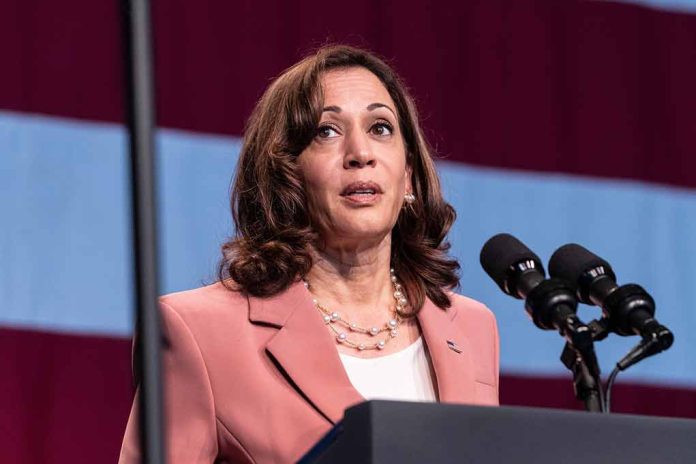
Vice President Kamala Harris’s campaign has made a surprising U-turn on electric vehicle mandates, leaving supporters and critics alike questioning her stance on environmental policies.
At a Glance
- Harris’s campaign now claims she does not support an electric vehicle mandate.
- This reversal contradicts her previous support for the Zero-Emission Vehicles Act of 2019.
- The Biden-Harris administration announced EV mandates in March 2024.
- Critics accuse Harris of flip-flopping on various issues, including fracking and immigration.
- The policy shift raises questions about the administration’s environmental strategy.
Harris Campaign’s Sudden Reversal on EV Mandates
In a surprising turn of events, Vice President Kamala Harris’s campaign has apparently withdrawn support for electric vehicle (EV) mandates, marking a significant departure from her previous stance on environmental regulations. This policy shift comes just months after the Biden-Harris administration announced ambitious EV mandates in March 2024, aiming for half of all new car sales to be electric by 2030.
The campaign’s reversal was communicated through a “fact check” email, dismissing claims by political opponents about Harris’s support for an electric vehicle mandate. Ammar Moussa, a campaign official for Harris, went as far as calling such claims a “lie,” stating, “Vice President Harris does not support an electric vehicle mandate.”
The bet is simple: Reverse every unpopular position in states like Michigan (EV mandate) and Pennsylvania (banning fracking/ending fossil fuels) and basically adopt all of Trump's positions. Then proceed to count on the media to not call this out because many want Trump defeated. https://t.co/AO54CD794l
— Joe Concha (@JoeConchaTV) August 27, 2024
Harris’s Previous Stance on EVs
The vice president’s current position stands in stark contrast to her earlier advocacy for stringent environmental regulations. As a senator, Harris co-sponsored the Zero-Emission Vehicles Act of 2019, which proposed banning the sale of gasoline-powered vehicles by 2040. The legislation aimed to require 50% of new passenger vehicle sales to be zero-emission by 2030, increasing to 100% by 2040.
“After model year 2040, the [Environmental Protection Agency] Administrator may issue an injunction on the manufacture of any passenger vehicles other than zero emission vehicles by a vehicle manufacturer,” reads the text of the proposed legislation supported by Harris.
Furthermore, during her 2020 presidential campaign, Harris advocated for even stricter standards, promoting a “bold plan for transitioning the United States to 100% zero-emission vehicles” by 2035. This aggressive stance aligned with her broader environmental agenda at the time.
Criticism and Accusations of Flip-Flopping
The abrupt policy reversal has not gone unnoticed, drawing criticism from various quarters. Larry Behrens, Communications Director for Power The Future, expressed skepticism about the change, suggesting it was politically motivated.
“Governor Lujan Grisham is one of Kamala Harris’ biggest supporters in the state, so to see the Vice President quickly abandon her failed energy agenda must be shocking,” said Behrens. “Forcing unwanted vehicles upon New Mexico’s working families is wrong no matter if it’s being done by Santa Fe or Washington, D.C. However, expect Governor Lujan Grisham to stay silent on this latest surrender because she likely knows Harris will quickly abandon this position again if she’s elected.”
Daniel Turner, Founder and Executive Director of Power The Future, echoed these sentiments, accusing Harris of abandoning policies that hurt her politically. He stated, “Combined with her fracking flip-flop, this is the second major reversal from Harris against the failed energy agenda she helped craft. The inconvenient truth is Kamala Harris will abandon anything she feels hurts her politically on her quest for more power. The American people shouldn’t fall for it.”
Critics have pointed out that this is not the first time Harris has been accused of changing her stance on key issues. She has previously reversed her positions on Medicare for All, banning fracking, and legalizing illegal immigration, raising questions about the consistency of her policy positions.
Implications for the Administration’s Environmental Strategy
The vice president’s policy reversal raises significant questions about the coherence and consistency of the Biden-Harris administration’s environmental strategy. While the administration has implemented measures to incentivize EV production and introduced tax credits for EV purchases, Harris’s distancing from the EV mandate policy actively pursued by the current government sends mixed signals to both industry stakeholders and the public.
As the 2024 election approaches, it remains to be seen how this policy shift will impact Harris’s standing among environmentally conscious voters and whether it will affect the administration’s broader climate change initiatives. For now, the reversal serves as a reminder of the complex and often contradictory nature of political positions in the face of changing public opinion and electoral pressures.
Sources:
- Harris campaign now says VP ‘does not support’ electric vehicle mandate in latest flip-flop
- BREAKDOWN: Kamala Harris Now Against EV Mandates Similar to MLG’s
- Flip-Flop Exit: Harris Suddenly Against Her EV Mandate
- Kamala Harris Campaign Makes Dramatic Policy U-Turn on Electric Cars
- Harris campaign now says VP ‘does not support’ electric vehicle mandate in latest flip-flop
- Kamala campaign flip-flops on EV mandates
- 12 misleading or lacking-in-context claims from Harris’ DNC speech
- Vice President Harris Reverses Course On Electric Vehicle Mandate Despite Admin Pushing EVs For Half Of Car Sales By 2030
- Anti-Oil Groups, Undeterred by Harris’s U-Turn on Fracking, Spend Big To Boost Her Campaign







